История зарубежной литературы конца XIX начала XX века
 Скачать 2.37 Mb. Скачать 2.37 Mb.
|
Chapter 19There is no use your telling me that you are going to be good,” cried Lord Henry, dipping his white fingers into a red copper bowl filled with rose-water. “You are quite perfect. Pray, don’t change.” Dorian Gray shook his head. “No, Harry, I have done too many dreadful things in my life. I am not going to do any more. I began my good actions yesterday.” “Where were you yesterday?” “In the country, Harry. I was staying at a little inn by myself.” “My dear boy,” said Lord Henry, smiling, “anybody can be good in the country. There are no temptations there. That is the reason why people who live out of town are so absolutely uncivilised. Civilisation is not by any means an easy thing to attain to. There are only two ways by which man can reach it. One is by being cultured, the other by being corrupt. Country people have no opportunity of being either, so they stagnate.” “Culture and corruption,” echoed Dorian. “I have known something of both. It seems terrible to me now that they should ever be found together. For I have a new ideal, Harry. I am going to alter. I think I have altered.” “You have not yet told me what your good action was. Or did you say you had done more than one?” asked his companion as he spilled into his plate a little crimson pyramid of seeded strawberries and, through a perforated, shell-shaped spoon, snowed white sugar upon them. “I can tell you, Harry. It is not a story I could tell to any one else. I spared somebody. It sounds vain, but you understand what I mean. She was quite beautiful and wonderfully like Sibyl Vane. I think it was that which first attracted me to her. You remember Sibyl, don’t you? How long ago that seems! Well, Hetty was not one of our own class, of course. She was simply a girl in a village. But I really loved her. I am quite sure that I loved her. All during this wonderful May that we have been having, I used to run down and see her two or three times a week. Yesterday she met me in a little orchard. The apple-blossoms kept tumbling down on her hair, and she was laughing. We were to have gone away together this morning at dawn. Suddenly I determined to leave her as flowerlike as I had found her.” “I should think the novelty of the emotion must have given you a thrill of real pleasure, Dorian,” interrupted Lord Henry. “But I can finish your idyll for you. You gave her good advice and broke her heart. That was the beginning of your reformation.” “Harry, you are horrible! You mustn’t say these dreadful things. Hetty’s heart is not broken. Of course, she cried and all that. But there is no disgrace upon her. She can live, like Perdita, in her garden of mint and marigold.” “And weep over a faithless Florizel,” said Lord Henry, laughing, as he leaned back in his chair. “My dear Dorian, you have the most curiously boyish moods. Do you think this girl will ever be really content now with any one of her own rank? I suppose she will be married some day to a rough carter or a grinning ploughman. Well, the fact of having met you, and loved you, will teach her to despise her husband, and she will be wretched. From a moral point of view, I cannot say that I think much of your great renunciation. Even as a beginning, it is poor. Besides, how do you know that Hetty isn’t floating at the present moment in some starlit mill-pond, with lovely water-lilies round her, like Ophelia?” “I can’t bear this, Harry! You mock at everything, and then suggest the most serious tragedies. I am sorry I told you now. I don’t care what you say to me. I know I was right in acting as I did. Poor Hetty! As I rode past the farm this morning, I saw her white face at the window, like a spray of jasmine. Don’t let us talk about it any more, and don’t try to persuade me that the first good action I have done for years, the first little bit of self-sacrifice I have ever known, is really a sort of sin. I want to be better. I am going to be better. Tell me something about yourself. What is going on in town? I have not been to the club for days.” “The people are still discussing poor Basil’s disappearance.” “I should have thought they had got tired of that by this time,” said Dorian, pouring himself out some wine and frowning slightly. “My dear boy, they have only been talking about it for six weeks, and the British public are really not equal to the mental strain of having more than one topic every three months. They have been very fortunate lately, however. They have had my own divorce-case and Alan Campbell’s suicide. Now they have got the mysterious disappearance of an artist. Scotland Yard still insists that the man in the grey ulster who left for Paris by the midnight train on the ninth of November was poor Basil, and the French police declare that Basil never arrived in Paris at all. I suppose in about a fortnight we shall be told that he has been seen in San Francisco. It is an odd thing, but every one who disappears is said to be seen at San Francisco. It must be a delightful city, and possess all the attractions of the next world.” “What do you think has happened to Basil?” asked Dorian, holding up his Burgundy against the light and wondering how it was that he could discuss the matter so calmly. “I have not the slightest idea. If Basil chooses to hide himself, it is no business of mine. If he is dead, I don’t want to think about him. Death is the only thing that ever terrifies me. I hate it.” “Why?” said the younger man wearily. “Because,” said Lord Henry, passing beneath his nostrils the gilt trellis of an open vinaigrette box, “one can survive everything nowadays except that. Death and vulgarity are the only two facts in the nineteenth century that one cannot explain away. Let us have our coffee in the music-room, Dorian. You must play Chopin to me. The man with whom my wife ran away played Chopin exquisitely. Poor Victoria! I was very fond of her. The house is rather lonely without her. Of course, married life is merely a habit, a bad habit. But then one regrets the loss even of one’s worst habits. Perhaps one regrets them the most. They are such an essential part of one’s personality.” Dorian said nothing, but rose from the table, and passing into the next room, sat down to the piano and let his fingers stray across the white and black ivory of the keys. After the coffee had been brought in, he stopped, and looking over at Lord Henry, said, “Harry, did it ever occur to you that Basil was murdered?” Lord Henry yawned. “Basil was very popular, and always wore a Waterbury watch. Why should he have been murdered? He was not clever enough to have enemies. Of course, he had a wonderful genius for painting. But a man can paint like Velasquez and yet be as dull as possible. Basil was really rather dull. He only interested me once, and that was when he told me, years ago, that he had a wild adoration for you and that you were the dominant motive of his art.” “I was very fond of Basil,” said Dorian with a note of sadness in his voice. “But don’t people say that he was murdered?” “Oh, some of the papers do. It does not seem to me to be at all probable. I know there are dreadful places in Paris, but Basil was not the sort of man to have gone to them. He had no curiosity. It was his chief defect.” “What would you say, Harry, if I told you that I had murdered Basil?” said the younger man. He watched him intently after he had spoken. “I would say, my dear fellow, that you were posing for a character that doesn’t suit you. All crime is vulgar, just as all vulgarity is crime. It is not in you, Dorian, to commit a murder. I am sorry if I hurt your vanity by saying so, but I assure you it is true. Crime belongs exclusively to the lower orders. I don’t blame them in the smallest degree. I should fancy that crime was to them what art is to us, simply a method of procuring extraordinary sensations.” “A method of procuring sensations? Do you think, then, that a man who has once committed a murder could possibly do the same crime again? Don’t tell me that.” “Oh! anything becomes a pleasure if one does it too often,” cried Lord Henry, laughing. “That is one of the most important secrets of life. I should fancy, however, that murder is always a mistake. One should never do anything that one cannot talk about after dinner. But let us pass from poor Basil. I wish I could believe that he had come to such a really romantic end as you suggest, but I can’t. I dare say he fell into the Seine off an omnibus and that the conductor hushed up the scandal. Yes: I should fancy that was his end. I see him lying now on his back under those dull-green waters, with the heavy barges floating over him and long weeds catching in his hair. Do you know, I don’t think he would have done much more good work. During the last ten years his painting had gone off very much.” Dorian heaved a sigh, and Lord Henry strolled across the room and began to stroke the head of a curious Java parrot, a large, grey-plumaged bird with pink crest and tail, that was balancing itself upon a bamboo perch. As his pointed fingers touched it, it dropped the white scurf of crinkled lids over black, glasslike eyes and began to sway backwards and forwards. “Yes,” he continued, turning round and taking his handkerchief out of his pocket; “his painting had quite gone off. It seemed to me to have lost something. It had lost an ideal. When you and he ceased to be great friends, he ceased to be a great artist. What was it separated you? I suppose he bored you. If so, he never forgave you. It’s a habit bores have. By the way, what has become of that wonderful portrait he did of you? I don’t think I have ever seen it since he finished it. Oh! I remember your telling me years ago that you had sent it down to Selby, and that it had got mislaid or stolen on the way. You never got it back? What a pity! it was really a masterpiece. I remember I wanted to buy it. I wish I had now. It belonged to Basil’s best period. Since then, his work was that curious mixture of bad painting and good intentions that always entitles a man to be called a representative British artist. Did you advertise for it? You should.” “I forget,” said Dorian. “I suppose I did. But I never really liked it. I am sorry I sat for it. The memory of the thing is hateful to me. Why do you talk of it? It used to remind me of those curious lines in some play—Hamlet, I think—how do they run?— “Like the painting of a sorrow, A face without a heart.” Yes: that is what it was like.” Lord Henry laughed. “If a man treats life artistically, his brain is his heart,” he answered, sinking into an arm-chair. Dorian Gray shook his head and struck some soft chords on the piano. “‘Like the painting of a sorrow,’” he repeated, “‘a face without a heart.’” The elder man lay back and looked at him with half-closed eyes. “By the way, Dorian,” he said after a pause, “‘what does it profit a man if he gain the whole world and lose—how does the quotation run?—his own soul’?” The music jarred, and Dorian Gray started and stared at his friend. “Why do you ask me that, Harry?” “My dear fellow,” said Lord Henry, elevating his eyebrows in surprise, “I asked you because I thought you might be able to give me an answer. That is all. I was going through the park last Sunday, and close by the Marble Arch there stood a little crowd of shabby-looking people listening to some vulgar street-preacher. As I passed by, I heard the man yelling out that question to his audience. It struck me as being rather dramatic. London is very rich in curious effects of that kind. A wet Sunday, an uncouth Christian in a mackintosh, a ring of sickly white faces under a broken roof of dripping umbrellas, and a wonderful phrase flung into the air by shrill hysterical lips—it was really very good in its way, quite a suggestion. I thought of telling the prophet that art had a soul, but that man had not. I am afraid, however, he would not have understood me.” “Don’t, Harry. The soul is a terrible reality. It can be bought, and sold, and bartered away. It can be poisoned, or made perfect. There is a soul in each one of us. I know it.” “Do you feel quite sure of that, Dorian?” “Quite sure.” “Ah! then it must be an illusion. The things one feels absolutely certain about are never true. That is the fatality of faith, and the lesson of romance. How grave you are! Don’t be so serious. What have you or I to do with the superstitions of our age? No: we have given up our belief in the soul. Play me something. Play me a nocturne, Dorian, and, as you play, tell me, in a low voice, how you have kept your youth. You must have some secret. I am only ten years older than you are, and I am wrinkled, and worn, and yellow. You are really wonderful, Dorian. You have never looked more charming than you do to-night. You remind me of the day I saw you first. You were rather cheeky, very shy, and absolutely extraordinary. You have changed, of course, but not in appearance. I wish you would tell me your secret. To get back my youth I would do anything in the world, except take exercise, get up early, or be respectable. Youth! There is nothing like it. It’s absurd to talk of the ignorance of youth. The only people to whose opinions I listen now with any respect are people much younger than myself. They seem in front of me. Life has revealed to them her latest wonder. As for the aged, I always contradict the aged. I do it on principle. If you ask them their opinion on something that happened yesterday, they solemnly give you the opinions current in 1820, when people wore high stocks, believed in everything, and knew absolutely nothing. How lovely that thing you are playing is! I wonder, did Chopin write it at Majorca, with the sea weeping round the villa and the salt spray dashing against the panes? It is marvellously romantic. What a blessing it is that there is one art left to us that is not imitative! Don’t stop. I want music to-night. It seems to me that you are the young Apollo and that I am Marsyas listening to you. I have sorrows, Dorian, of my own, that even you know nothing of. The tragedy of old age is not that one is old, but that one is young. I am amazed sometimes at my own sincerity. Ah, Dorian, how happy you are! What an exquisite life you have had! You have drunk deeply of everything. You have crushed the grapes against your palate. Nothing has been hidden from you. And it has all been to you no more than the sound of music. It has not marred you. You are still the same.” “I am not the same, Harry.” “Yes, you are the same. I wonder what the rest of your life will be. Don’t spoil it by renunciations. At present you are a perfect type. Don’t make yourself incomplete. You are quite flawless now. You need not shake your head: you know you are. Besides, Dorian, don’t deceive yourself. Life is not governed by will or intention. Life is a question of nerves, and fibres, and slowly built-up cells in which thought hides itself and passion has its dreams. You may fancy yourself safe and think yourself strong. But a chance tone of colour in a room or a morning sky, a particular perfume that you had once loved and that brings subtle memories with it, a line from a forgotten poem that you had come across again, a cadence from a piece of music that you had ceased to play—I tell you, Dorian, that it is on things like these that our lives depend. Browning writes about that somewhere; but our own senses will imagine them for us. There are moments when the odour of lilas blanc passes suddenly across me, and I have to live the strangest month of my life over again. I wish I could change places with you, Dorian. The world has cried out against us both, but it has always worshipped you. It always will worship you. You are the type of what the age is searching for, and what it is afraid it has found. I am so glad that you have never done anything, never carved a statue, or painted a picture, or produced anything outside of yourself! Life has been your art. You have set yourself to music. Your days are your sonnets.” Dorian rose up from the piano and passed his hand through his hair. “Yes, life has been exquisite,” he murmured, “but I am not going to have the same life, Harry. And you must not say these extravagant things to me. You don’t know everything about me. I think that if you did, even you would turn from me. You laugh. Don’t laugh.” “Why have you stopped playing, Dorian? Go back and give me the nocturne over again. Look at that great, honey-coloured moon that hangs in the dusky air. She is waiting for you to charm her, and if you play she will come closer to the earth. You won’t? Let us go to the club, then. It has been a charming evening, and we must end it charmingly. There is some one at White’s who wants immensely to know you—young Lord Poole, Bournemouth’s eldest son. He has already copied your neckties, and has begged me to introduce him to you. He is quite delightful and rather reminds me of you.” “I hope not,” said Dorian with a sad look in his eyes. “But I am tired to-night, Harry. I shan’t go to the club. It is nearly eleven, and I want to go to bed early.” “Do stay. You have never played so well as to-night. There was something in your touch that was wonderful. It had more expression than I had ever heard from it before.” “It is because I am going to be good,” he answered, smiling. “I am a little changed already.” “You cannot change to me, Dorian,” said Lord Henry. “You and I will always be friends.” “Yet you poisoned me with a book once. I should not forgive that. Harry, promise me that you will never lend that book to any one. It does harm.” “My dear boy, you are really beginning to moralise. You will soon be going about like the converted, and the revivalist, warning people against all the sins of which you have grown tired. You are much too delightful to do that. Besides, it is no use. You and I are what we are, and will be what we will be. As for being poisoned by a book, there is no such thing as that. Art has no influence upon action. It annihilates the desire to act. It is superbly sterile. The books that the world calls immoral are books that show the world its own shame. That is all. But we won’t discuss literature. Come round to-morrow. I am going to ride at eleven. We might go together, and I will take you to lunch afterwards with Lady Branksome. She is a charming woman, and wants to consult you about some tapestries she is thinking of buying. Mind you come. Or shall we lunch with our little duchess? She says she never sees you now. Perhaps you are tired of Gladys? I thought you would be. Her clever tongue gets on one’s nerves. Well, in any case, be here at eleven.” “Must I really come, Harry?” “Certainly. The park is quite lovely now. I don’t think there have been such lilacs since the year I met you.” “Very well. I shall be here at eleven,” said Dorian. “Good night, Harry.” As he reached the door, he hesitated for a moment, as if he had something more to say. Then he sighed and went out. Chapter 20 It was a lovely night, so warm that he threw his coat over his arm and did not even put his silk scarf round his throat. As he strolled home, smoking his cigarette, two young men in evening dress passed him. He heard one of them whisper to the other, “That is Dorian Gray.” He remembered how pleased he used to be when he was pointed out, or stared at, or talked about. He was tired of hearing his own name now. Half the charm of the little village where he had been so often lately was that no one knew who he was. He had often told the girl whom he had lured to love him that he was poor, and she had believed him. He had told her once that he was wicked, and she had laughed at him and answered that wicked people were always very old and very ugly. What a laugh she had!—just like a thrush singing. And how pretty she had been in her cotton dresses and her large hats! She knew nothing, but she had everything that he had lost. When he reached home, he found his servant waiting up for him. He sent him to bed, and threw himself down on the sofa in the library, and began to think over some of the things that Lord Henry had said to him. Was it really true that one could never change? He felt a wild longing for the unstained purity of his boyhood—his rose-white boyhood, as Lord Henry had once called it. He knew that he had tarnished himself, filled his mind with corruption and given horror to his fancy; that he had been an evil influence to others, and had experienced a terrible joy in being so; and that of the lives that had crossed his own, it had been the fairest and the most full of promise that he had brought to shame. But was it all irretrievable? Was there no hope for him? Ah! in what a monstrous moment of pride and passion he had prayed that the portrait should bear the burden of his days, and he keep the unsullied splendour of eternal youth! All his failure had been due to that. Better for him that each sin of his life had brought its sure swift penalty along with it. There was purification in punishment. Not “Forgive us our sins” but “Smite us for our iniquities” should be the prayer of man to a most just God. The curiously carved mirror that Lord Henry had given to him, so many years ago now, was standing on the table, and the white-limbed Cupids laughed round it as of old. He took it up, as he had done on that night of horror when be had first noted the change in the fatal picture, and with wild, tear-dimmed eyes looked into its polished shield. Once, some one who had terribly loved him had written to him a mad letter, ending with these idolatrous words: “The world is changed because you are made of ivory and gold. The curves of your lips rewrite history.” The phrases came back to his memory, and he repeated them over and over to himself. Then he loathed his own beauty, and flinging the mirror on the floor, crushed it into silver splinters beneath his heel. It was his beauty that had ruined him, his beauty and the youth that he had prayed for. But for those two things, his life might have been free from stain. His beauty had been to him but a mask, his youth but a mockery. What was youth at best? A green, an unripe time, a time of shallow moods, and sickly thoughts. Why had he worn its livery? Youth had spoiled him. It was better not to think of the past. Nothing could alter that. It was of himself, and of his own future, that he had to think. James Vane was hidden in a nameless grave in Selby churchyard. Alan Campbell had shot himself one night in his laboratory, but had not revealed the secret that he had been forced to know. The excitement, such as it was, over Basil Hallward’s disappearance would soon pass away. It was already waning. He was perfectly safe there. Nor, indeed, was it the death of Basil Hallward that weighed most upon his mind. It was the living death of his own soul that troubled him. Basil had painted the portrait that had marred his life. He could not forgive him that. It was the portrait that had done everything. Basil had said things to him that were unbearable, and that he had yet borne with patience. The murder had been simply the madness of a moment. As for Alan Campbell, his suicide had been his own act. He had chosen to do it. It was nothing to him. A new life! That was what he wanted. That was what he was waiting for. Surely he had begun it already. He had spared one innocent thing, at any rate. He would never again tempt innocence. He would be good. As he thought of Hetty Merton, he began to wonder if the portrait in the locked room had changed. Surely it was not still so horrible as it had been? Perhaps if his life became pure, he would be able to expel every sign of evil passion from the face. Perhaps the signs of evil had already gone away. He would go and look. He took the lamp from the table and crept upstairs. As he unbarred the door, a smile of joy flitted across his strangely young-looking face and lingered for a moment about his lips. Yes, he would be good, and the hideous thing that he had hidden away would no longer be a terror to him. He felt as if the load had been lifted from him already. He went in quietly, locking the door behind him, as was his custom, and dragged the purple hanging from the portrait. A cry of pain and indignation broke from him. He could see no change, save that in the eyes there was a look of cunning and in the mouth the curved wrinkle of the hypocrite. The thing was still loathsome—more loathsome, if possible, than before—and the scarlet dew that spotted the hand seemed brighter, and more like blood newly spilled. Then he trembled. Had it been merely vanity that had made him do his one good deed? Or the desire for a new sensation, as Lord Henry had hinted, with his mocking laugh? Or that passion to act a part that sometimes makes us do things finer than we are ourselves? Or, perhaps, all these? And why was the red stain larger than it had been? It seemed to have crept like a horrible disease over the wrinkled fingers. There was blood on the painted feet, as though the thing had dripped—blood even on the hand that had not held the knife. Confess? Did it mean that he was to confess? To give himself up and be put to death? He laughed. He felt that the idea was monstrous. Besides, even if he did confess, who would believe him? There was no trace of the murdered man anywhere. Everything belonging to him had been destroyed. He himself had burned what had been below-stairs. The world would simply say that he was mad. They would shut him up if he persisted in his story. . . . Yet it was his duty to confess, to suffer public shame, and to make public atonement. There was a God who called upon men to tell their sins to earth as well as to heaven. Nothing that he could do would cleanse him till he had told his own sin. His sin? He shrugged his shoulders. The death of Basil Hallward seemed very little to him. He was thinking of Hetty Merton. For it was an unjust mirror, this mirror of his soul that he was looking at. Vanity? Curiosity? Hypocrisy? Had there been nothing more in his renunciation than that? There had been something more. At least he thought so. But who could tell? . . . No. There had been nothing more. Through vanity he had spared her. In hypocrisy he had worn the mask of goodness. For curiosity’s sake he had tried the denial of self. He recognised that now. But this murder—was it to dog him all his life? Was he always to be burdened by his past? Was he really to confess? Never. There was only one bit of evidence left against him. The picture itself—that was evidence. He would destroy it. Why had he kept it so long? Once it had given him pleasure to watch it changing and growing old. Of late he had felt no such pleasure. It had kept him awake at night. When he had been away, he had been filled with terror lest other eyes should look upon it. It had brought melancholy across his passions. Its mere memory had marred many moments of joy. It had been like conscience to him. Yes, it had been conscience. He would destroy it. He looked round and saw the knife that had stabbed Basil Hallward. He had cleaned it many times, till there was no stain left upon it. It was bright, and glistened. As it had killed the painter, so it would kill the painter’s work, and all that that meant. It would kill the past, and when that was dead, he would be free. It would kill this monstrous soul-life, and without its hideous warnings, he would be at peace. He seized the thing, and stabbed the picture with it. There was a cry heard, and a crash. The cry was so horrible in its agony that the frightened servants woke and crept out of their rooms. Two gentlemen, who were passing in the square below, stopped and looked up at the great house. They walked on till they met a policeman and brought him back. The man rang the bell several times, but there was no answer. Except for a light in one of the top windows, the house was all dark. After a time, he went away and stood in an adjoining portico and watched. “Whose house is that, Constable?” asked the elder of the two gentlemen. “Mr. Dorian Gray’s, sir,” answered the policeman. They looked at each other, as they walked away, and sneered. One of them was Sir Henry Ashton’s uncle. Inside, in the servants’ part of the house, the half-clad domestics were talking in low whispers to each other. Old Mrs. Leaf was crying and wringing her hands. Francis was as pale as death. After about a quarter of an hour, he got the coachman and one of the footmen and crept upstairs. They knocked, but there was no reply. They called out. Everything was still. Finally, after vainly trying to force the door, they got on the roof and dropped down on to the balcony. The windows yielded easily—their bolts were old. When they entered, they found hanging upon the wall a splendid portrait of their master as they had last seen him, in all the wonder of his exquisite youth and beauty. Lying on the floor was a dead man, in evening dress, with a knife in his heart. He was withered, wrinkled, and loathsome of visage. It was not till they had examined the rings that they recognised who it was. The End О творчестве Оскара Уайльда Из книги А.Аникста «История английской литературы» («Учпедгиз», 1956) «Таким образом, судьба Дориана опровергает философию аморального гедонизма: нельзя безнаказанно нарушать законы естественной нравственности, отказ от морали ведет человека к гибели. Но если таков финальный вывод, то все предшествовавшее ему самыми яркими красками расцвечивает порочную жизнь Дориана Грея. Любимая идея Уайльда о том, что искусство стоит выше жизни, получила выражение в той роли, которую играет в произведении портрет героя. Облик живого Дориана не выражает сущности его порочной, насквозь развращенной натуры. Только на портрете видно, каков на самом деле Дориан. Этим Уайльд хотел выразить мысль, что искусство вернее самой действительности выражает душу, сущность характеров и явлений» (С.381). Из Предисловия Н. Пальцева «Триумф и трагедия Оскара Уайльда» (к изданию «Оскар Уайльд» Серия Золотой фонд мировой классики Издательство НФ «Пушкинская библиотека, Москва, 2004) О романе «Портрет Дориана Грея»: «На этом фоне, где реальное соприкасалось со сверхъестественным, развертывалась странная, причудливая, никак не соотносимая с повседневностью история, отдаленно напоминающая фаустовскую. И в ней, в этой истории непримиримого конфликта между сущностным и видимым, явью и иллюзией. Законом жизнеподобия и законом жизни, недвусмысленно обозначилась этико-философская доминанта всего уайльдовского творчества: торжества самоотречения над эгоизмом, бескорыстного подвижничества над самодовольной созерцательностью, неподдельного творческого горения над самоцельным мерцанием. Духовное во всей широте его конкретных проявлений - вот единственная реальная ценность мира: раскрываясь в несостоятельности «мефистофельской сделки» Дориана, покупающего вечную молодость ценой многих жизней, эта мысль ни на миг не ускользает и от внимания Уайльда-романиста» (С.12) Сам Оскар Уайльд так объяснял смысл «Портрета Дориана Грея»: «Истинная мораль моего романа заключается в том, что всякое излишество, как и всякое самоотречение. Влечет за собой наказание. И эта мораль столь нарочито и искусно скрыта, что не провозглашает себя всеобщим принципом, реализуясь в процессе жизни отдельных характеров, и таким образом становится лишь драматическим элементом, а не самим его предметом. Из Предисловия А.Зверева «Неспасающая красота» (к изданию Жак де Ланглад «Оскар Уайльд, или правда масок» из серии ЖЗЛ Москва, Молодая гвардия, Палимпсест, 2006) «… ничего притворного в Уайльде не было. Знаменитый афоризм героя Достоевского, что красота спасет мир, лучше всего мог бы выразить суть и дух убеждений английского поэта. Никто, кажется, не относился к подобным мыслям настолько серьезно, как он, хотя его самого красота не спасла… Но для Уайльда между этими понятиями - идеалы, жизнь - не было разрыва. Чудо красоты внушало ему священный трепет, и он слагал гимны прекрасному, взирая на художника, как на мага, чья власть беспредельна» (С.10). «Уайльд… противопоставлял себя «толпе»… Тепло обыкновенной жизни с ее простыми заботами, драмами и чаяниями оставляло его вполне равнодушным. Его вообще влекло за горизонт будничности, и как художник он всего органичнее осуществил себя, доверяясь чудесному, сказочному, рожденному фантазией и вдохновенной импровизацией» (С. 13). Из монографии А.А.Федорова «Эстетизм и художественные поиски в английской прозе последней трети Х1Х века» (Уфа, 1993) «…следует особо выделить интерес эстетизма к античности и к наследию Платона и, в частности, к его учению о прекрасном. По Платону, именно прекрасное снимает противоположность земного и идеального через становление внутреннего митра человека» (С.26). «В эстетизме романтическая интерпретация идей Платона о прекрасном получила дальнейшее своеобразное развитие… сторонников эстетизма особенно привлекла платоновская теория «эротического» восхождения к идеальному через гармонию красоты и конкретного чувства, возвышающего человека» (С.27). О Пейтере: «…новым вкладом Пейтера в развитие философской и эстетической мысли принято считать утверждение им «духа относительного»: «Современная мысль отличается от древней тем, что вместо «духа абсолютного», она развивает «дух относительного»… Пейтер обратил внимание на субъективность процесса познания, полагая, что именно она помогает сохранять его духовно-гуманистическое содержание» (С.40-41). Об Оскаре Уайльде: «О.Уайльд охарактеризовал Пейтера как «интеллектуального импрессиониста» (С.45). «… Философской основой эстетизма Уайльда следует признать наследие Платона, который «в сфере философии был не ученым, но провидцем» (С.88). «Считая важной заслугой мыслителя постановку вопроса об идеальном и действительном, Уайльд выше всего в платонизме ценил обоснование категории прекрасного» (С.89). «Не только статьи, но и письма Уайльда свидетельствуют о том, что помимо «Государства», на него большое влияние оказал диалог Платона «Пир» (С.93). «…в английском эстетизме нашли свое своеобразное продолжение традиции романтического мифологизма, и, в частности, было характерно стремление к созданию некой новой мифологии, подтверждающей осуществимость идеалов эстетизма. Некоторые факты биографии и письма Уайльда говорят о том, что он мечтал о практическом преодолении глубокой пропасти между красотой, искусством и повседневностью» (С.94). О романе Уайльда «Портрет Дориана Грея» - «В романе раскрывается своеобразие уайльдовской трактовки идей Платона о прекрасной личности и красоте. Только искусство является источником духовного совершенствования и возвышения человека и, отстаивая эту идею, Уайльд чрезвычайно преувеличивал значение красоты, доходя до культа прекрасного, чего не было у Платона» (С.111). «Портрет Дориана Грея» можно рассматривать как произведение, где ставится эксперимент на платоновскую тему соотношения между идеальным и действительным» (С.111). А.А.Федоров указывает на связь этого романа с диалогом Платона «Пир». Также, по мнению автора монографии, в имени героя (Дориан) есть намек на термин «дорический» (обозначал одну из групп древнегреческих племен). «Дорическое начало нашло отражение в культе Аполлона. Таким образом, Дориан является «олицетворением античного идеала красоты». Вопросы для дискуссии
Актуальные аспекты темы (для курсовых и дипломных работ)
Ключевые слова этого занятия: ЭСТЕТИЗМ, МИФОЛОГИЗМ, ПРЕРАФАЭЛИТЫ, ПЛАТОН, ПАРАДОКС, ИСКУССТВО, ЗЕРКАЛО, ПОРТРЕТ. Л И Т Е Р А Т У Р А 1. Оскар Уайльд. Портрет Дориана Грея. (Любое издание) 2. Оскар Уайльд. Статьи о литературе // Уайльд О. Полное собрание сочинений. Под ред. К.Чуковского – СПб., 1912. 3. А.Аникст. Оскар Уайльд // Аникст А. История английской литературы. М. 1956. 3. Акройд П. Последнее завещание Оскара Уайльда. – М., 1993. 4. Жак де Ланглад. Оскар Уайльд. М. 2006. 5. Соколянский М. Оскар Уайльд. – Киев; Одесса, 1990. 6. Татаринова Л.Н. Два прочтения мифа о Пигмалионе: Оскар Уайльд и Бернард Шоу // Дидактика художественного текста. Выпуск 2. Краснодар. 2002. 7. Толмачев В. Типология символизма //Зарубежная литература конца 19 – начала 20 века. М., Академа. 2003. 8. Урнов М.В. На рубеже веков. Очерки английской литературы (конец 19 – начало 20 века). М., 1970. 9. Федоров А.А. Эстетизм и художественные поиски в английской прозе последней трети Х1Х века. Уфа, 1993. Прерафаэлиты. Репродукции картин. См. след. стр. 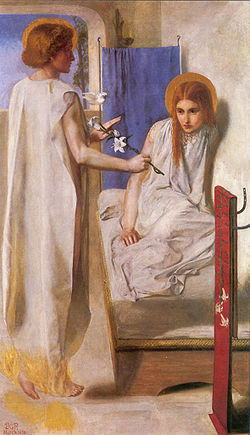 Д. Г. Россети. Благовещение. 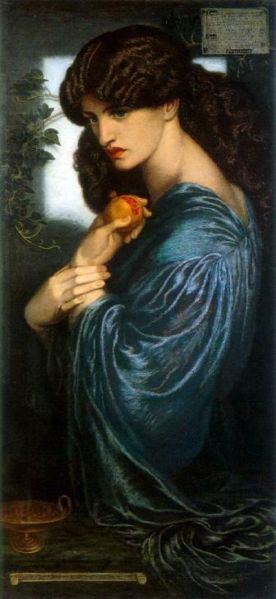 Д.Г. Россети. Прзерпина. 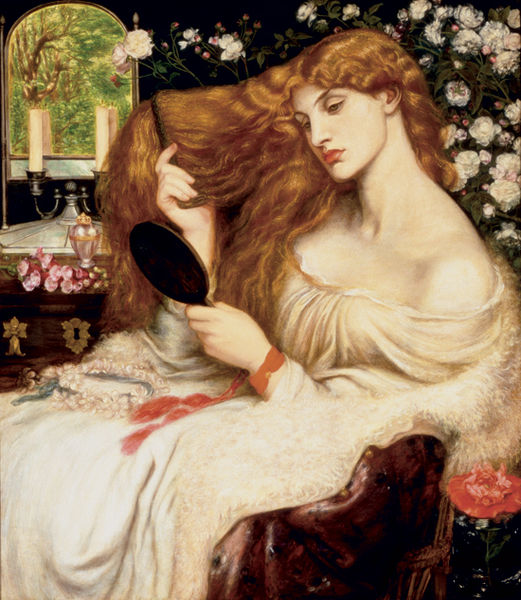 Д.Г. Россети. Леди Лилит. 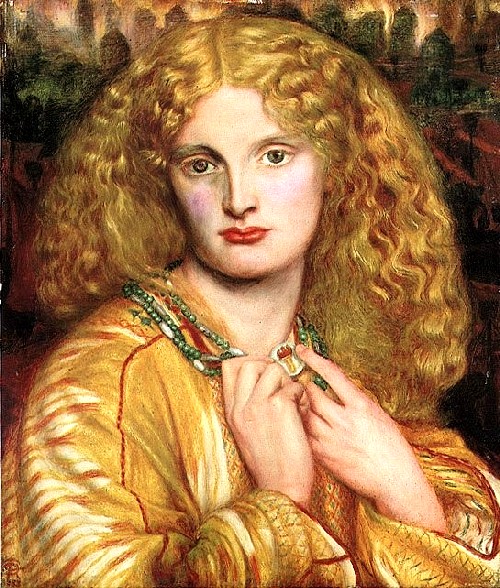 Д.Г. Россети. Спарта-Хелен. 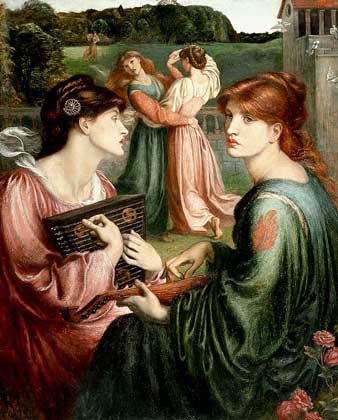 Д.Г. Россети. Луг, обрамленный деревьями. 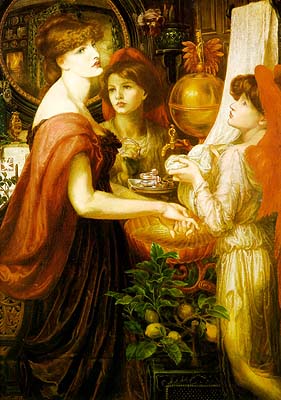 Д.Г. Россети. Чудесные руки. 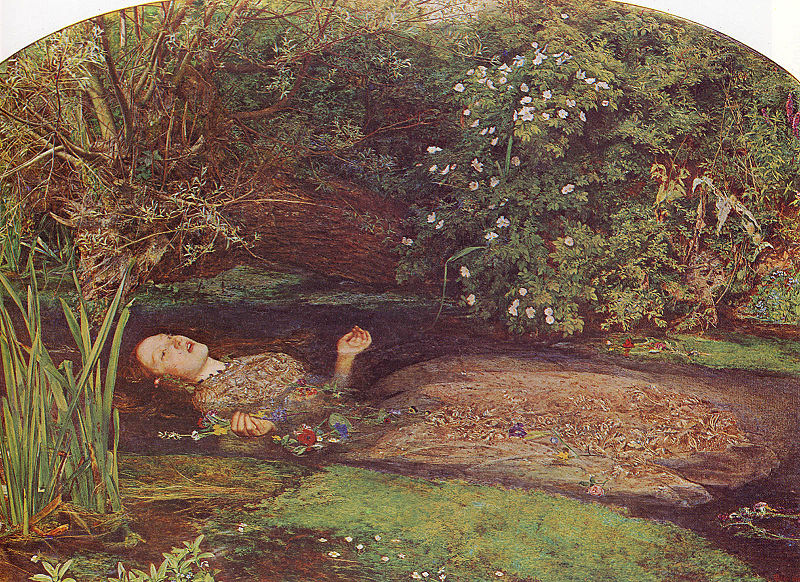 Д.Э. Миллес. Офелия. 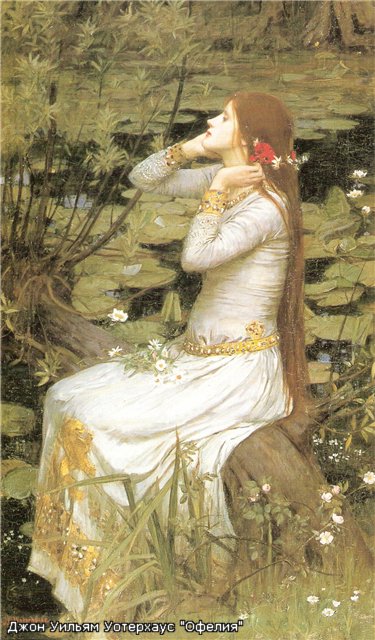 Д. У. Уотерхаус. Офелия. 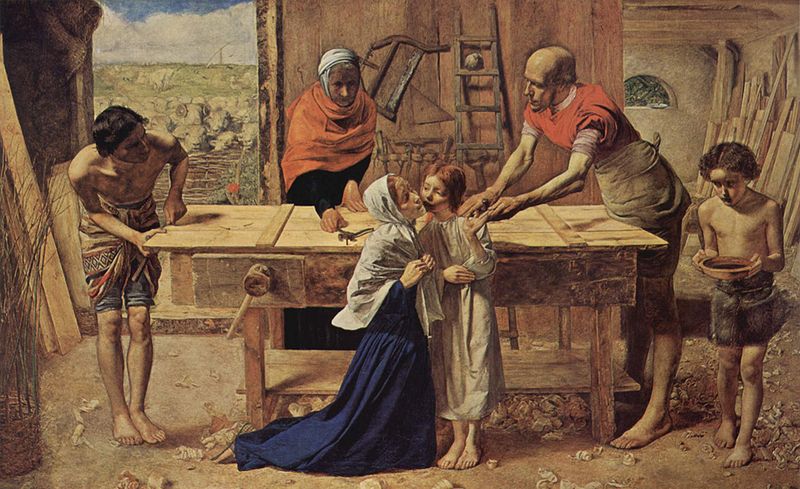 Д.Э. Миллес. Христос в плотницкой мастерской (Христос в доме родителей). 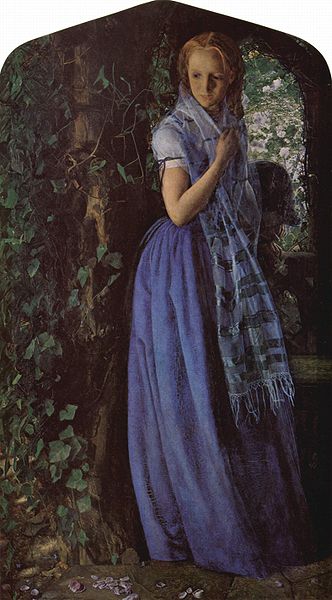 А. Хьюджес. 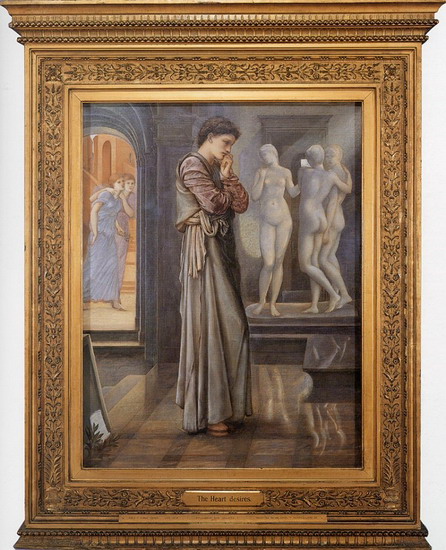 Э. Берн-Джонс. Пигмалион и статуя: Сердечное желание. 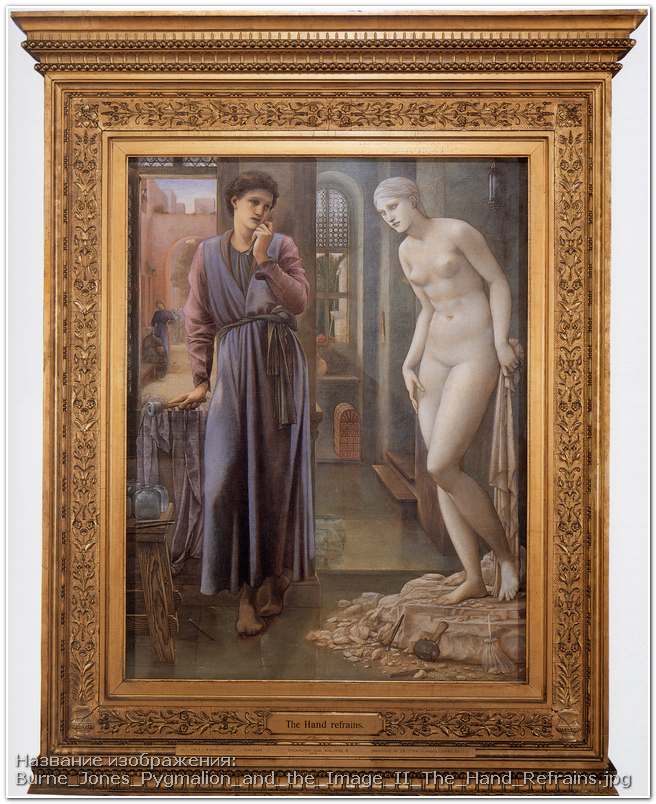 Э. Берн-Джонс. Пигмалион и статуя: Рука не смеет. 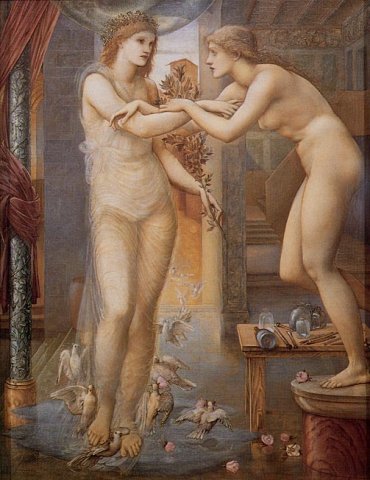 Э. Берн-Джонс. Пигмалион и статуя: Боги благословляют. 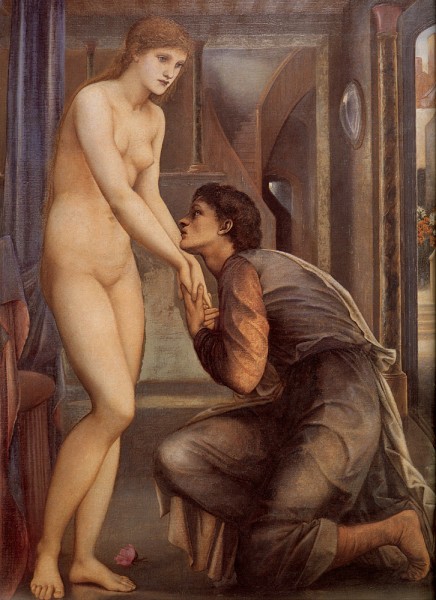 Э. Берн-Джонс. Пигмалион и статуя: Душа получает. |
